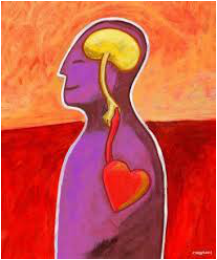La cabeza del hombre percibe dos cosas: la ira del corazón y el deseo de amar.
A human head perceives two things: the heart's anger and the desire to love. (Ocana)
 Conflicting emotions leads to unbalanced behavior
Conflicting emotions leads to unbalanced behavior This proverb comes from the odu Ocana, which is an odu of extremes. It references the connection between the heart and mind, and how our emotions influence our thinking. Most humans have an innate need to love and be loved. The desire to love shapes our thinking and behavior, and motivates us to form connections to other people. At the same time, Ocana speaks of people who are self-centered and easily provoked to rage. Perceived slights, injustices, or disappointments provoke anger, which embeds itself in the heart and puts up barriers that keep others at arm's length. Rage feeds their thoughts and propels their actions, butting up against their natural desire to love. For this reason, people who get Ocana in a reading are often conflicted deep within themselves, and have trouble thinking clearly because their emotions cloud their thoughts too much.
Why Are You Acting Like This??
 The head and the heart are connected
The head and the heart are connected Anger breeds hatred, the opposite of love. These are very strong feelings that influence our decisions and actions. What goes on in the heart affects the mind. This proverb reminds us that when we make a decision or take an action, we have to consider what's motivating us? Are we acting out of love, or rage? Are we trying to hurt someone to "get even" for something they've done to us? Or are we concerned about someone else's feelings? Are we bearing a grudge from the past that influences how we treat everyone around us? Or are we willing to give new people in our lives the benefit of the doubt? As the proverb suggests, we aren't making neutral, calm, balanced decisions. We're only seeing extremes, and that's putting us into an overly excited state of mind. Whether we're acting for good or for bad, we're not acting rationally. We're letting our emotions rule us.
Love and anger are legitimate and real emotions, but they need to be analyzed rationally, too. Are our feelings within healthy boundaries, or are they out of control and causing us to make bad decisions and act unwisely? Do we understand the basis of our emotions? There will always be a tension between the head and the heart, but that tension should make us feel vibrant and alive, not wound up so tightly that we feel like we're going to snap. We need to think about how we react to disappointment and failure in love relationships, so that the anger doesn't fester and make it impossible to create new bonds with other people. And, sometimes, it merely tells us that we're living too much inside our own head and heart. We need to think about the other people around us, and consider their feelings and thoughts, too. We need to cultivate compassion and the ability to see another's point of view.
 RSS Feed
RSS Feed
